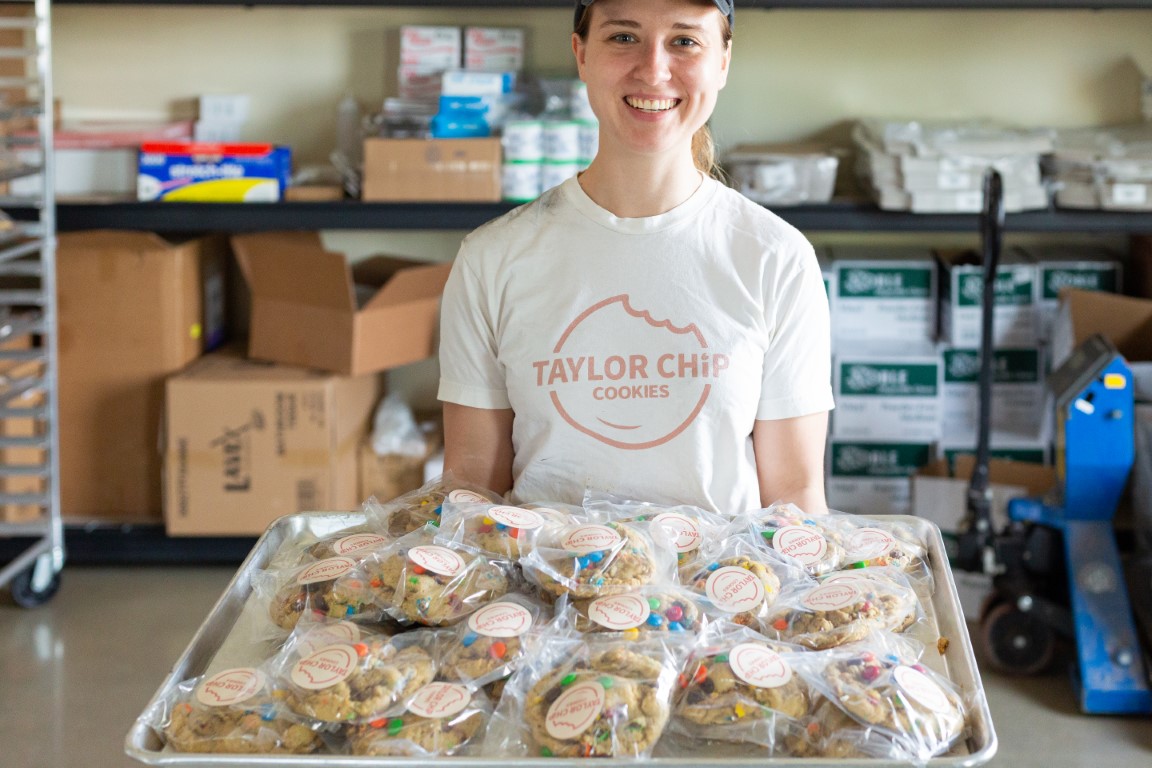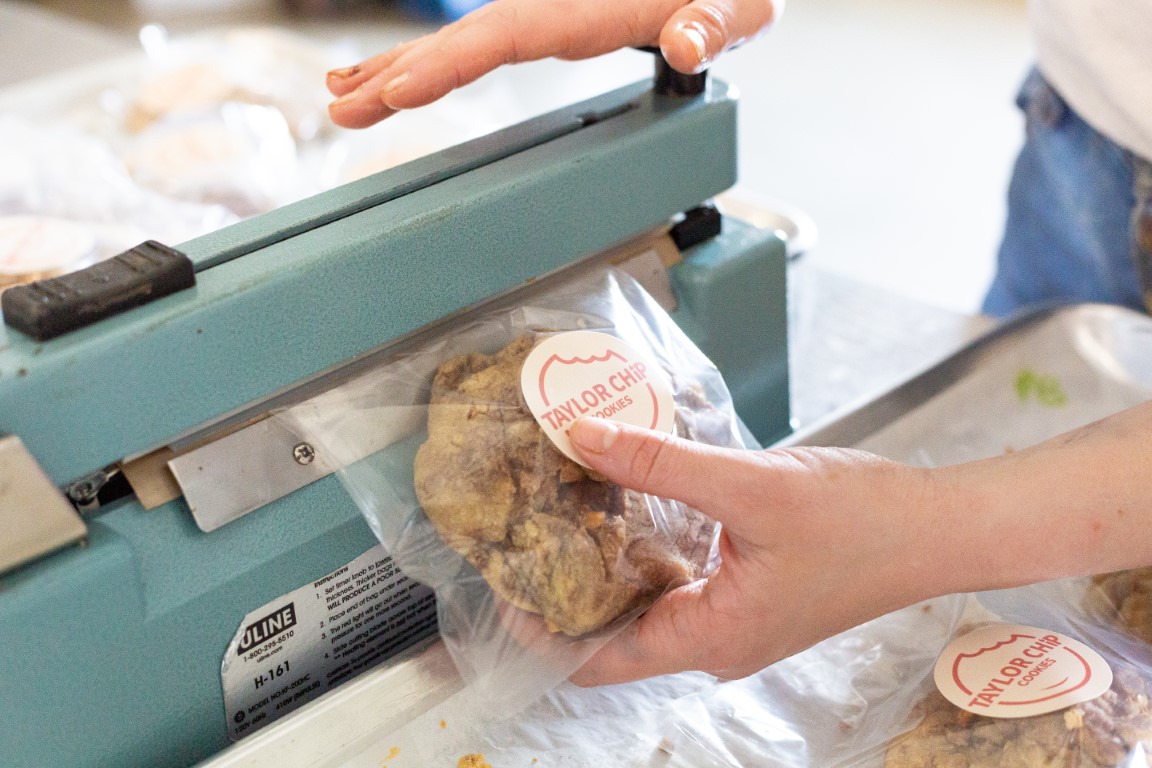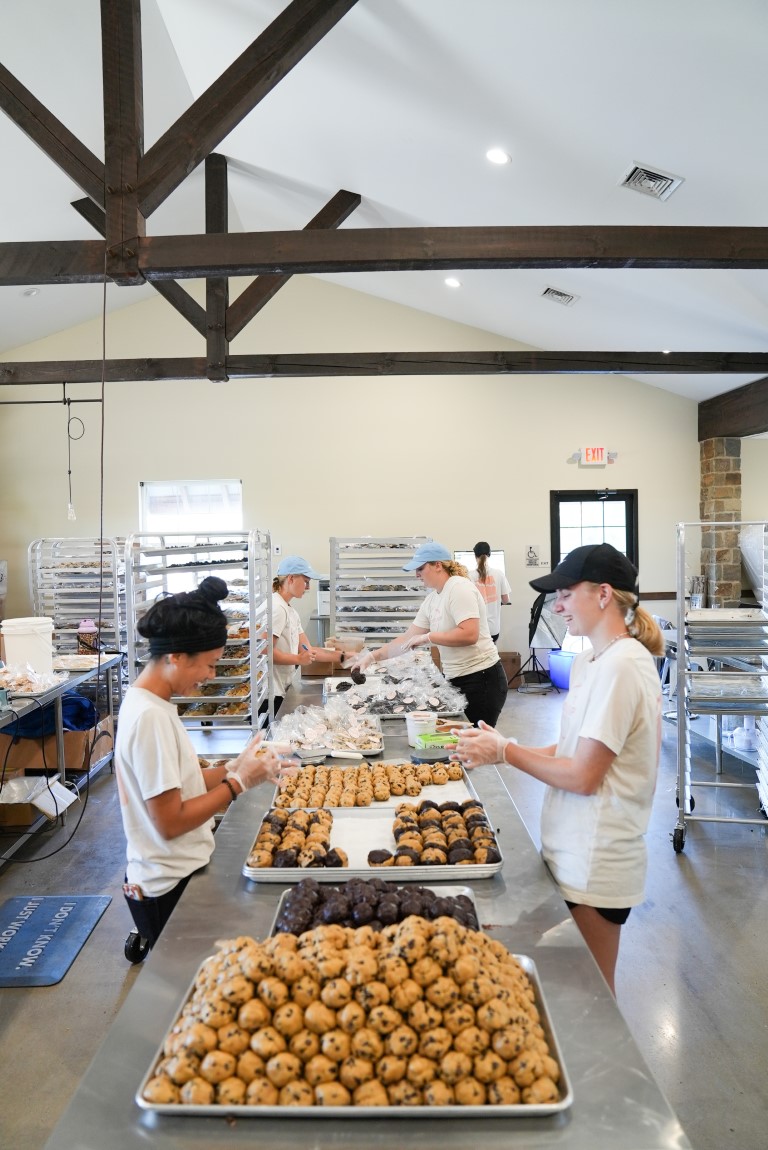When you bake a fresh batch of homemade cookies, you might wonder how long they'll stay delicious. Typically, cookies kept in an airtight container at room temperature last about a week, while refrigeration can extend their freshness up to two weeks. But what if you need them to last even longer? Freezing is an excellent option, preserving cookies for several months with the right wrapping. However, the type of cookie and storage methods play essential roles in their longevity. Curious about the best ways to keep your cookies tasting fresh? Let's explore the factors that can affect their shelf life.
Key Takeaways
- Homemade cookies last about a week at room temperature in an airtight container.
- Refrigeration can extend cookie freshness up to two weeks.
- Properly stored cookies can be frozen for several months.
- Perishable ingredients like eggs and dairy shorten cookie shelf life.
- Avoid direct sunlight and strong odors to maintain cookie flavor and freshness.
Factors Affecting Cookie Shelf Life
When it comes to how long your homemade cookies will stay fresh, several factors come into play. The ingredients you use, how you store them, and the environmental conditions all greatly impact their shelf life. Understanding these elements can help you keep your cookies delicious and safe to eat for as long as possible.
Ingredients
The ingredients you choose play an important role in determining how long your homemade cookies will stay fresh. Different types of cookie dough, such as those used for sugar cookies and chocolate chip cookies, contain varying ingredients that can greatly affect their shelf life. For instance, perishable ingredients like eggs and dairy can lead to a shorter shelf life, making it vital to store these cookies properly to maintain freshness.
When preparing your homemade cookies, opt for high-quality ingredients, as they can influence the overall freshness and longevity of your baked goods. Using airtight containers is key to preserving your cookies, as it helps to prevent moisture and air from compromising their texture and flavor. Fresh cookies can stay delicious for a few days, but if stored improperly, they can quickly become stale.
Sugar cookies, which often have simpler ingredients, may last longer than chocolate chip cookies, especially if stored in suitable cookie storage containers. The choice of ingredients also impacts how your cookies fare over time. By being mindful of the types of ingredients you use, you can better manage the shelf life of your homemade cookies and enjoy them at their freshest.
Storage Methods
Proper storage methods are essential for extending the shelf life of your homemade cookies. The right techniques can keep your cookies fresh and delicious for days, even weeks.
First, consider using an air-tight container. These storage containers prevent air from reaching the cookies, which helps maintain their moisture and flavor. Additionally, layering your cookies with wax paper can prevent them from sticking together.
- Store in an air-tight container: This keeps cookies fresh longer.
- Use plastic wrap or zip-top bags: These can also seal in freshness.
- Add a piece of bread: This can absorb excess moisture and keep cookies soft.
Another option is to individually wrap cookies in plastic wrap or place them in a zip-top bag before storing them in a cookie jar. This method reduces the risk of them becoming stale. If you plan to store cookies for an extended period, freezing them is a viable option. Use a zip-top bag or an air-tight container to protect the cookies from freezer burn. Remember to separate the cookies with wax paper to prevent sticking. By employing these storage methods, your homemade cookies will stay fresh and enjoyable much longer.
Environmental Conditions
While storing cookies correctly can greatly extend their freshness, environmental conditions also play an essential role in how long your homemade treats will last. The shelf life of baked cookies is heavily influenced by factors like temperature, humidity, and exposure to light. To maximize their longevity, consider the following guidelines:
First, always store your cookies in an airtight plastic container to prevent exposure to moisture and air, both of which can cause them to go stale or moldy. Moisture can make cookies lose their crunch or become overly soft, depending on the type of cookie.
Avoid placing the container with cookies in direct sunlight. Light can accelerate the degradation process and affect the taste and texture of your cookies. Keep them in a cool, dark place to maintain their quality.
For long-term storage, freeze cookies. Freezing halts the staling process and can preserve cookies for several months. Make sure they're properly sealed to avoid freezer burn and maintain flavor.
Lastly, keep baked cookies away from other strongly scented foods. Cookies in air that's filled with strong odors can absorb these scents, altering their taste. By managing these environmental conditions, you'll extend your homemade cookies' shelf life effectively.

Choose Your Own Delightfully Perfect Cookies.
With almost 30 flavors to choose from, you can make your box as unique as you are.
General Shelf Life and Storage Options
When storing your homemade cookies, understanding how different environments affect their longevity is essential. At room temperature, cookies generally last for about a week, but refrigeration can extend their freshness up to two weeks. For long-term storage, freezing your cookies can preserve them for several months without compromising quality.
Room Temperature
Homemade cookies, when stored at room temperature, typically remain fresh for about a week. To maximize their shelf life, you should store your cookies properly. Use an airtight container to prevent them from becoming stale cookies just a few days after baking. The typical ingredients in homemade cookies, like chocolate chips, butter, and flour, can stay fresh if stored correctly.
When storing, consider these options:
- Airtight Container: Place your batch of cookies in an airtight container to keep them soft and flavorful.
- Cookie Sheet: If you don't have an airtight container, you can lay the cookies on a cookie sheet and cover them with plastic wrap or aluminum foil.
- Separate Layers: If you have different types of cookies, or a large batch of cookies, use parchment paper to separate layers within the container of cookies.
Refrigeration
Storing homemade cookies in the refrigerator can extend their shelf life beyond what you'd expect at room temperature. Different cookie types, such as baked drop cookies, can remain fresh for up to a week when stored properly in the fridge. To keep your cookies moist and delicious, use airtight plastic containers. This will prevent them from absorbing any unwanted odors or moisture from the refrigerator.
When storing cookies in the fridge, first verify they have cooled completely to avoid condensation, which can make them soggy. If you have homemade cookie dough, refrigerating it before baking can improve the flavor and texture. For baked cookies, place them on a baking sheet in a single layer before transferring them to an airtight container. This step helps maintain their shape and prevents sticking.
While refrigeration is effective for short-term storage, it's not the only option. Some prefer to put cookies in the freezer for longer preservation. However, when using the fridge, remember that cookies stored this way should be consumed within a week for ideal taste and texture. Proper storage methods are essential to keep your homemade cookies fresh and enjoyable.
Freezing
While refrigeration is great for short-term storage, freezing offers a longer-term solution to keep your homemade cookies fresh. By freezing, you can extend the shelf life of both baked cookies and frozen cookie dough for months, making it an ideal option for those who like to prepare cookies in advance.
To freeze your cookies or dough properly, guarantee you use air-tight freezer containers or an air-tight freezer safe container. These containers prevent the cookies from absorbing any unwanted freezer odors and protect them from freezer burn. Here are some tips to help you freeze your cookies effectively:
- Pre-freeze larger batches: Lay out the cookies or scooped dough on a baking sheet, freeze until solid, then transfer them to an air-tight container.
- Label and date: Always label your containers with the type of cookie and the freezing date to keep track of freshness.
- Use cookie tins: Once the cookies are frozen solid, store them in cookie tins for added protection.
Whether you're freezing baked holiday cookies, store-bought cookies, or huge batches of homemade cutout cookie dough, the process remains largely the same. If you've got dough in the fridge and want to extend its life further, freezing is a reliable option.
Signs of Spoilage
To determine if your homemade cookies have gone bad, start by looking for any visual indicators like mold or discoloration. Pay attention to changes in texture; if the cookies feel unusually hard, stale, or crumbly, they may no longer be good to eat. Additionally, trust your senses of smell and taste; a sour or off smell and an odd or bitter taste are clear signs of spoilage.
Visual Indicators
One of the easiest ways to determine if your homemade cookies have spoiled is by examining their appearance. Whether you made homemade sugar cookies, chewy cookies, or crisp cookies, visual indicators can reveal a lot about their freshness. Start by inspecting the surface of the cookies. Freshly baked cookies, whether you've prepared the dough in advance or not, should have consistent color and texture.
Here are some visual signs to watch for:
- Mold: Look for any signs of mold, which can appear as green, white, or black spots. Mold is a clear indication that the cookies are no longer safe to eat.
- Discoloration: Notice if the cookies have turned a different color than when they were first baked. This can mean the cookies have gone stale or worse.
- Dryness: Check if the cookies appear excessively dry or cracked. Dry cookies can indicate they've been exposed to air for too long.
When you cool cookies, placing them on parchment paper can help maintain their original texture, whether they're meant to be soft or crisp. If cookies appear limp or overly soft when they should be firm, this could also signal spoilage. Always verify your baking process is thorough to maximize the shelf life of your treats.
Texture Changes
How can you tell if your homemade cookies have gone bad just by touching them? Start with the texture. Soft cookies, like chewy chocolate chip cookies, should feel slightly pliable. If they become unusually hard or crumbly, that's a sign they've gone stale. Delicate cookies, such as classic sugar cookies, should maintain a light, crisp texture. When these cookies turn overly brittle, it's time to evaluate their freshness.
Frosted cookies present another challenge. The frosting can attract moisture, making the cookie soggy over time. When you touch frosted cookies and feel an overly sticky or mushy surface, it indicates spoilage. On the other hand, unfrosted cookies generally have a longer shelf life but can still show signs of spoilage by turning dry and hard.
During holiday baking, you may produce a large batch of cookies using various cookie recipes. Pay attention to texture changes, as even slight variations can indicate spoilage. For example, cookie dough ingredients like butter and eggs can affect how quickly a cookie goes stale. Whether you're checking your stored holiday treats or the batch you baked last weekend, touch is a reliable way to gauge freshness.
Smell and Taste
When it comes to determining if your homemade cookies have gone bad, smell and taste are vital indicators. Relying on these senses can help you avoid unpleasant surprises, especially if you've baked cookies in bulk for events like family birthday cookies or cookies for gifts. Spoiled cookies often emit a sour, rancid, or otherwise off-putting odor that's easy to notice.
To help identify spoilage through smell and taste, consider the following:
- Odd or sour odor: Fresh cookies, whether they're chewy or crisp, should have a pleasant, inviting aroma. If they smell off, it's a sign they're no longer good.
- Strange taste: A quick taste test can reveal if your cookies have deteriorated. Spoiled cookies might taste stale, bitter, or just "off."
- Texture change: While not directly related to smell or taste, a notable change in texture, like chewy cookies becoming overly hard, can also indicate spoilage.
Whether you've made baked icebox cookies, cookies unfrosted, or cookies separate from a large batch, these signs are essential for maintaining the quality and life of cookies. Remember, batches of cookies disappear quickly when fresh, but once they start to spoil, it's clear they're past their prime.
Extending Cookie Shelf Life
To keep your homemade cookies fresh for as long as possible, you need to use proper storage techniques. Airtight containers are essential for maintaining freshness, as they prevent moisture from getting in and making the cookies stale. Additionally, freezing methods can considerably extend the shelf life, allowing you to enjoy your treats weeks or even months later.
Proper Storage Techniques
Proper storage techniques make all the difference when it comes to extending the shelf life of homemade cookies. To maintain their freshness, you should always store your cookies properly. Begin by ensuring that your batch of cookies is completely cooled before storage. This prevents condensation, which can make soft cookies soggy.
For cookies from scratch, a single layer arrangement is ideal to prevent sticking, especially if they have royal icing. Use a piece of parchment paper between each layer if stacking is necessary. This simple step helps maintain food safety techniques and keeps the cookies intact. Here's how you can do it effectively:
- Use airtight containers: This keeps air out and moisture in, preserving the cookies' texture and flavor.
- Separate different types: Store soft cookies separately from crunchy ones to maintain their unique textures.
- Freeze for longer storage: If you have raw cookie dough or freshly baked cookies, freezing them can extend their shelf life for weeks.
Airtight Containers
Storing cookies properly is just the beginning; using airtight containers can greatly enhance their shelf life. When you seal your freshly baked cookies in these containers, you're protecting them from air and moisture, two culprits that can make cookies stale. Whether you've made softer cookies or drier cookies, keeping them in airtight containers guarantees they retain their ideal texture for a longer period.
As a baking enthusiast, you might find yourself making large amounts of cookies, either for your family or as cookies to gift. Proper storage becomes vital to maintain their freshness. Whether you've baked cookies without frosting or a batch of dough that you plan to bake later, airtight containers are key.
Freezing Methods
Freezing cookies is a fantastic way to extend their shelf life while preserving their delicious flavor and texture. By using the right freezing methods, you can keep various types of cookies fresh for months. First, allow your cookies to cool completely before freezing to prevent condensation, which can cause ice crystals.
Types of Cookies Suitable for Freezing:
- Drop cookies like chocolate chip or oatmeal cookies
- Cutout cookies such as sugar cookies
- Dense cookies including shortbread and peanut butter cookies
To freeze baked cookies, place them in a single layer on a baking sheet, then freeze until solid. Transfer the frozen cookies to an airtight container or a heavy-duty freezer bag, using parchment paper to separate layers and prevent sticking. For cookie dough, scoop or roll it into individual portions before freezing. This method works well for drop cookies, cutout cookies, and even shortbread cookies.
When you're ready to enjoy them, thaw cookies at room temperature or bake frozen cookie dough directly from the freezer, adding a few extra minutes to the baking time. Proper storage guarantees that your homemade cookies stay just as delightful as the day you made them.
Frequently Asked Questions
Can Homemade Cookies Be Frozen to Extend Their Shelf Life?
You're wondering if you can freeze homemade cookies to extend their shelf life. Absolutely, you can! Freeze them in an airtight container, and they'll stay fresh for up to three months. Just thaw before enjoying.
Do Different Types of Cookies Have Different Shelf Lives?
Yes, different types of cookies have different shelf lives. You'll find that soft cookies often go stale quicker than their crunchy counterparts. Storing them properly in airtight containers can help extend their freshness.
How Do Ingredients Affect Cookie Shelf Life?
Your choice of ingredients directly impacts cookie shelf life. Fresh ingredients like eggs and dairy shorten shelf life, while preservatives or dehydrated elements extend it. Always store cookies in airtight containers to maintain freshness longer.
Is It Safe to Eat Cookies Past Their Expiration Date?
You might wonder if it's safe to eat cookies past their expiration date. If they've been stored properly and don't show signs of spoilage, it's usually fine. Always check for mold, off smells, or unusual texture.
What Is the Best Way to Store Cookies to Maintain Freshness?
To keep your cookies fresh, store them in an airtight container at room temperature. You can also freeze them in a sealed bag for longer storage. Avoid refrigerating, as it can make them go stale faster.
Conclusion
In summary, homemade cookies can be kept fresh for about a week at room temperature in airtight containers, up to two weeks if refrigerated, and several months when frozen. To maximize their shelf life, guarantee proper storage and be mindful of the ingredients and type of cookie. Always watch for signs of spoilage, such as changes in texture, smell, or appearance, to enjoy your cookies at their best quality.











